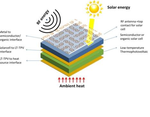
- Joined
- Jul 4, 2009
- Messages
- 16,556
- Helped
- 5,157
- Reputation
- 10,347
- Reaction score
- 5,218
- Trophy points
- 1,393
- Location
- Aberdyfi, West Wales, UK
- Activity points
- 140,017
What are you going to do with 1mV? It is nowhere near enough to charge your battery or even run any of the equipment.
Brian.
Brian.






